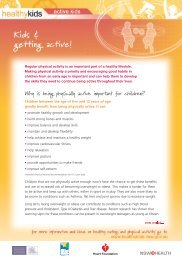I Move We Move - Good For Kids - NSW Government
I Move We Move - Good For Kids - NSW Government
I Move We Move - Good For Kids - NSW Government
You also want an ePaper? Increase the reach of your titles
YUMPU automatically turns print PDFs into web optimized ePapers that Google loves.
Resource 2: Sample physical activity policy<br />
(Insert early childhood service name) recognises the importance of physical activity for young<br />
children. Implementation of appropriate physical activity practices in Children's Services supports<br />
the health and development of children in care, as well as assisting in establishing positive lifestyle<br />
habits for the future.<br />
Aim<br />
The purpose of this policy is to ensure that children in care are supported and encouraged to<br />
engage in active play, develop fundamental movement skills and limit small screen recreation time<br />
in line with current draft recommendations.<br />
The National Physical Activity Recommendations for Children 0-5 years* 6 are:<br />
• “<strong>For</strong> healthy development in infants (birth to 1 year), physical activity – particularly supervised<br />
floor-based play in safe environments – should be encouraged from birth;<br />
• Toddlers (1 to 3 years of age) and pre-schoolers (3 to 5 years of age) should be physically active<br />
every day for at least three hours, spread throughout the day;<br />
• Infants, toddlers, and pre-schoolers should not be sedentary, restrained, or kept inactive, for<br />
more than one hour at a time, with the exception of sleeping”.*<br />
• “Children younger than 2 years of age should not spend any time watching television or using<br />
other electronic media (DVDs, computer and other electronic games)<br />
• <strong>For</strong> children 2 to 5 years of age, sitting and watching television and the use of other electronic<br />
media (DVDs, computer and other electronic games) should be limited to less than one hour per day”*<br />
* These recommendations are draft and subject to endorsement by the Australian Health Ministers’ Conference.<br />
Strategies<br />
1. Promote physical activity and skill development<br />
The service will:<br />
• Aim to encourage toddler and preschoolers to accumulate at least _____ hours of physical<br />
activity during their time in care<br />
• Ensure staff provide daily opportunities for both adult guided skill development activities and<br />
physically active free play indoors and outdoors<br />
• Ensure staff role model and join in active play time<br />
• Ensure staff use verbal prompts to provide children with encouragement and positive<br />
reinforcement to participate in active play<br />
• Adopt a participatory approach, emphasising fun and participation rather than competition<br />
• Ensure inclusive practices for all children including those from culturally and linguistically<br />
diverse backgrounds and those with special needs<br />
2. Provide physical activity based learning experiences for children both opportunistically<br />
and throughout the program<br />
The service will:<br />
• Ensure physical activity learning experiences are planned consistently throughout the program<br />
and the curriculum<br />
• Ensure that staff routinely identify opportunities to engage children, educate and promote<br />
appropriate physical activity skills and active play<br />
• Discuss with children the role of small screen time in their lives and support them in making<br />
healthy choices about their use of small screen recreation for both education and recreation<br />
I <strong>Move</strong> <strong>We</strong> <strong>Move</strong>, The Guide Edition 1 August 2009<br />
AREA HEALTH SERVICE<br />
2.12




